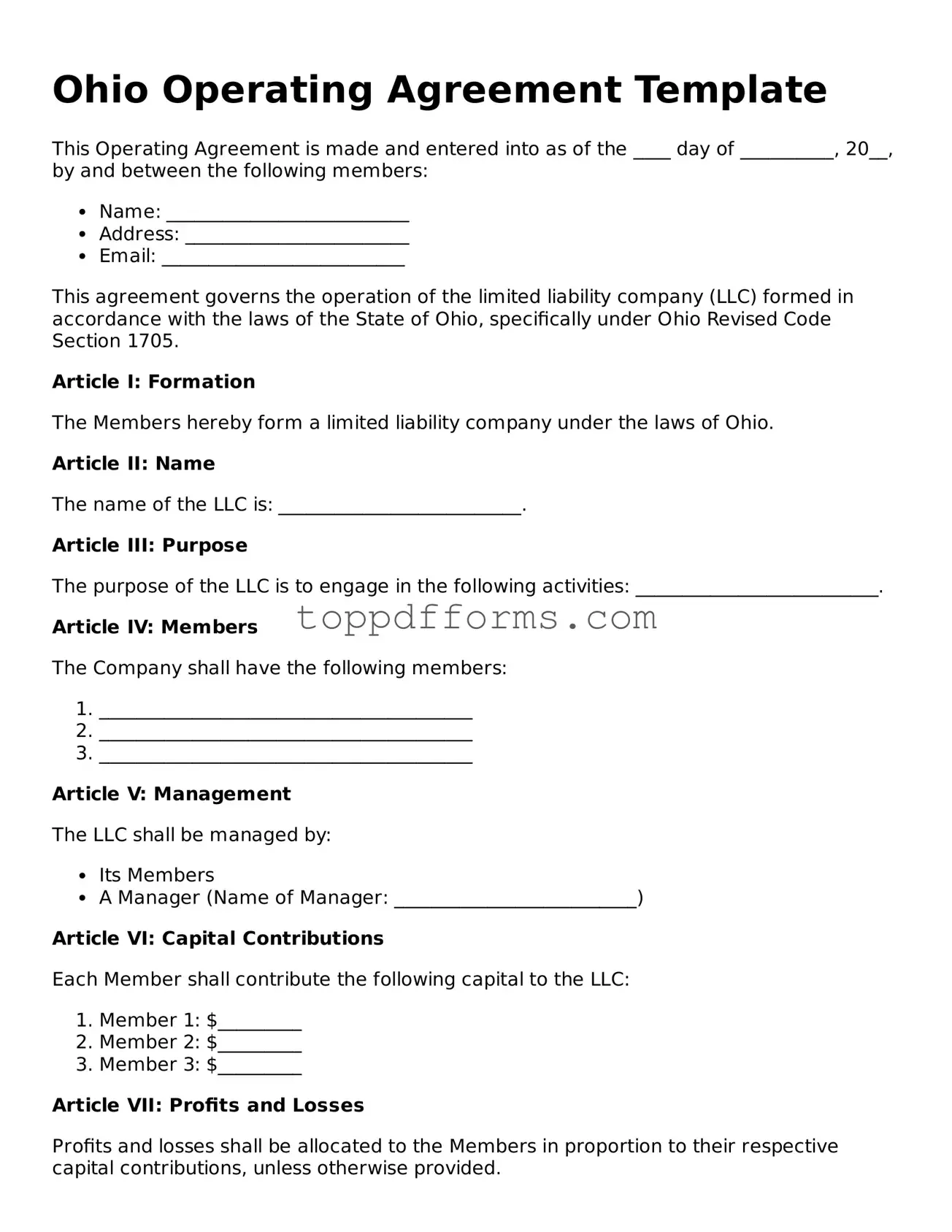Operating Agreement Document for Ohio State
Things You Should Know About This Form
What is an Ohio Operating Agreement?
An Ohio Operating Agreement is a legal document that outlines the management structure and operating procedures of a Limited Liability Company (LLC) in Ohio. This agreement serves as a guide for how the LLC will function, detailing the rights and responsibilities of its members, how profits and losses will be distributed, and the procedures for decision-making. Having this agreement in place helps prevent misunderstandings and conflicts among members.
Is an Operating Agreement required in Ohio?
No, an Operating Agreement is not legally required in Ohio. However, it is highly recommended. While Ohio law allows LLCs to operate without one, having an Operating Agreement can provide clarity and structure. It can also help protect your limited liability status by demonstrating that your LLC is a separate entity from its members.
Who should create the Operating Agreement?
What should be included in the Operating Agreement?
Can the Operating Agreement be amended?
What happens if there is no Operating Agreement?
How can I obtain an Ohio Operating Agreement template?
PDF Overview
| Fact Name | Details |
|---|---|
| Definition | An Ohio Operating Agreement is a legal document that outlines the management structure and operating procedures of a limited liability company (LLC). |
| Governing Law | The Ohio Revised Code, specifically Section 1705, governs the formation and operation of LLCs in Ohio. |
| Purpose | This agreement serves to define the roles of members and managers, helping to prevent disputes by clarifying expectations. |
| Not Mandatory | While an Operating Agreement is not legally required in Ohio, it is highly recommended for all LLCs to have one. |
| Customization | Members can customize the agreement to suit their specific needs, allowing for flexibility in management and profit distribution. |
| Member Rights | The agreement outlines the rights and responsibilities of each member, ensuring everyone is on the same page. |
| Amendments | Changes to the Operating Agreement can be made as needed, provided all members agree to the amendments. |
| Dispute Resolution | Many Operating Agreements include clauses for resolving disputes, such as mediation or arbitration, to avoid lengthy court battles. |
| Tax Considerations | The agreement can specify how profits and losses are allocated among members, which can have tax implications for the LLC. |
| Record Keeping | It is advisable to keep the Operating Agreement with other important company documents, as it may be requested by banks or legal entities. |
Common mistakes
When filling out the Ohio Operating Agreement form, individuals often overlook critical details that can lead to complications down the line. One common mistake is failing to include all members of the LLC. Each member should be clearly listed to ensure that everyone’s rights and responsibilities are defined. Omitting a member can create confusion and potential disputes later.
Another frequent error is neglecting to specify the management structure of the LLC. Whether the company will be member-managed or manager-managed should be clearly stated. This distinction impacts how decisions are made and who has authority within the organization.
Inaccurate information is also a common pitfall. Providing incorrect names, addresses, or other details can lead to legal issues. It’s essential to double-check all entries for accuracy before submission.
Many individuals fail to outline the capital contributions of each member. This section is crucial as it determines each member’s financial stake in the LLC. Without this information, disputes regarding profit sharing and losses may arise.
Another mistake is not addressing the distribution of profits and losses. Clearly defining how profits and losses will be allocated among members can prevent misunderstandings and conflicts in the future.
Some people skip the section on member voting rights. Each member’s voting power should be established to ensure that decisions are made fairly and in accordance with the members’ interests.
Additionally, individuals often overlook the importance of including procedures for adding or removing members. Establishing these processes upfront can save time and reduce friction if changes occur in the future.
Failing to include a buy-sell agreement is another error. This agreement outlines what happens if a member wants to sell their interest in the LLC or if a member passes away. It is crucial for ensuring smooth transitions and protecting the interests of remaining members.
Some individuals do not review the entire document thoroughly before signing. This oversight can lead to agreeing to terms that may not align with their intentions or understanding of the agreement.
Finally, neglecting to keep a copy of the completed Operating Agreement is a mistake that can have long-term consequences. Retaining a copy ensures that all members have access to the agreed-upon terms and can refer to them when needed.
Other Common State-specific Operating Agreement Forms
How Much Does an Llc Cost in Texas - This agreement specifies how new members can be added in the future.
Llc Operating Agreement California Template - This document governs the relationship among members of an LLC.
Florida Multi Member Llc Operating Agreement Template - This agreement can include buyout provisions for departing members.
In order to smoothly navigate the process of purchasing or selling a recreational vehicle, it is important to have the appropriate documentation ready, such as the Texas RV Bill of Sale. By utilizing this form, both parties can ensure a transparent transaction, protecting their interests and providing proof of ownership transfer. For those interested in convenient resources, you can find the necessary documents at PDF Templates.
How to Write an Operating Agreement - Having an Operating Agreement can streamline interactions among members and contribute to smooth operations.
